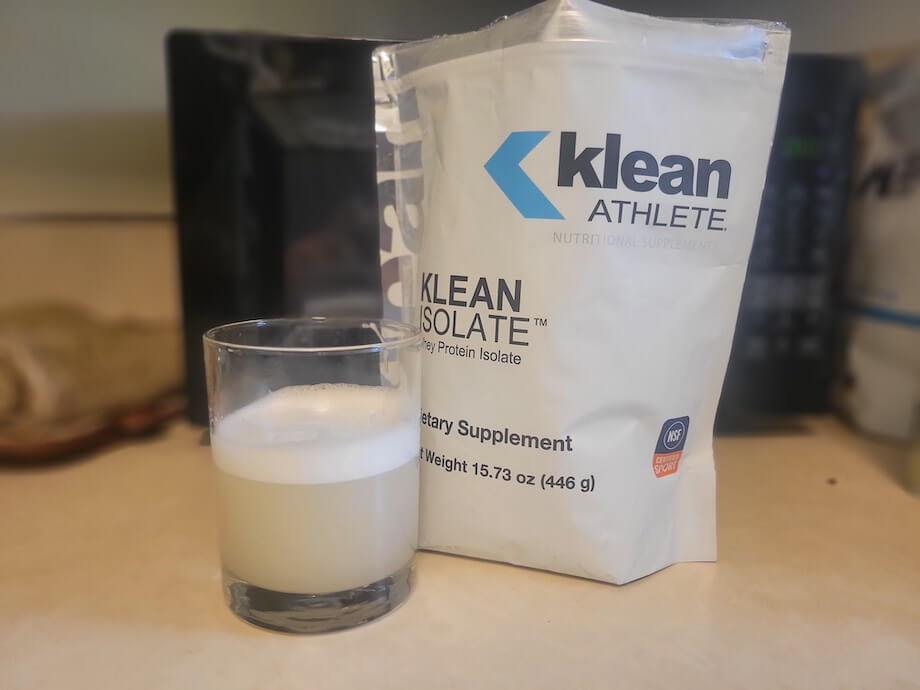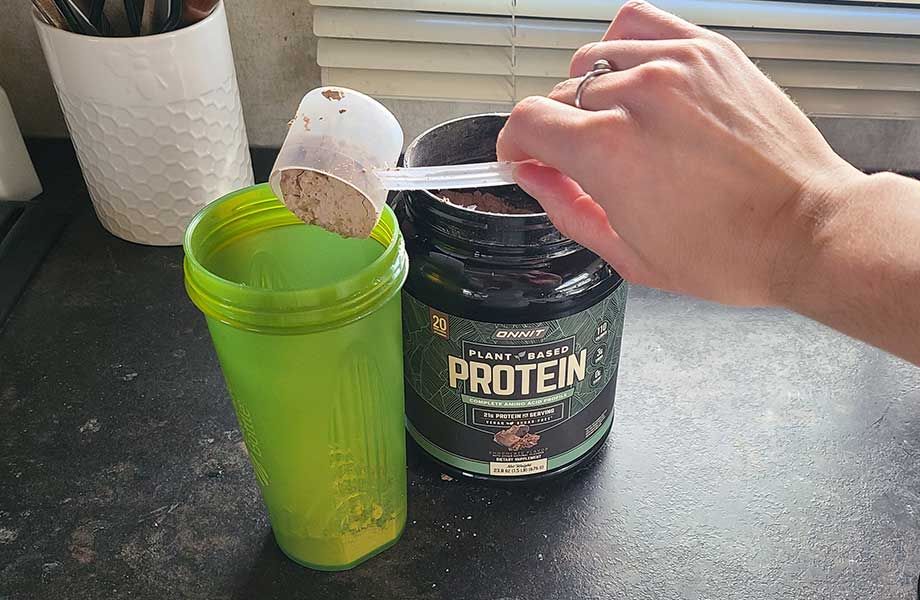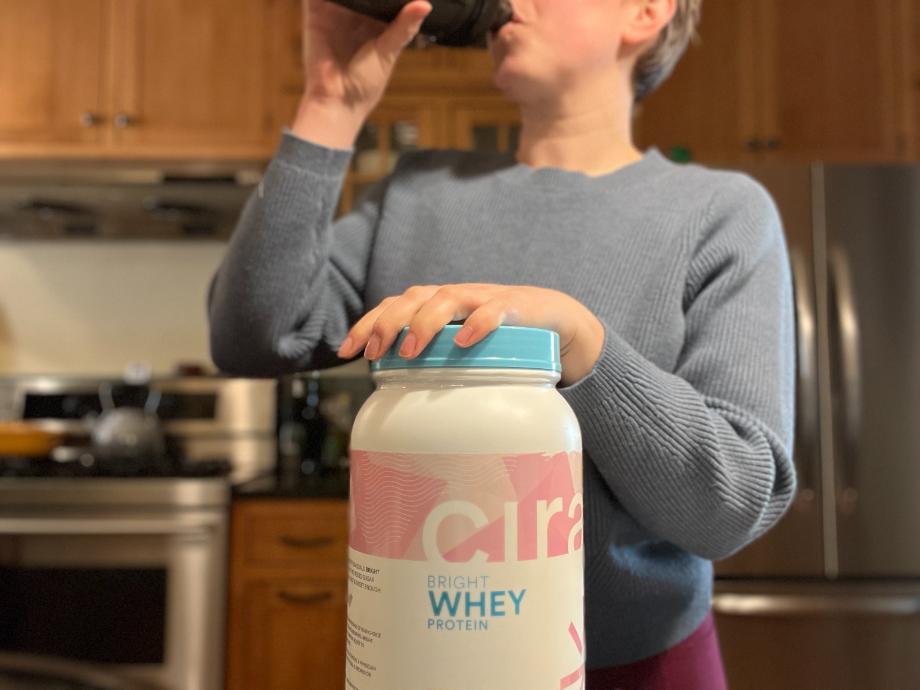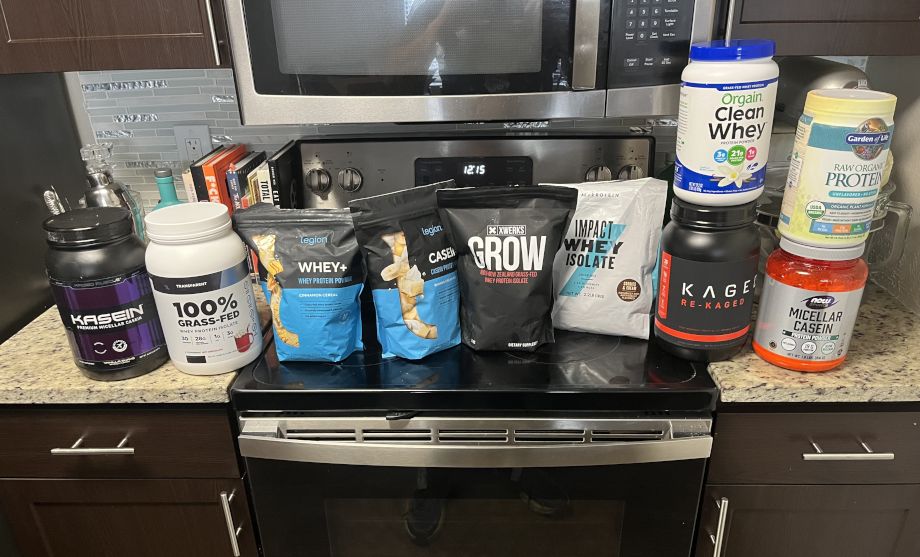We test and review fitness products based on an independent, multi-point methodology. If you use our links to purchase something, we may earn a commission. Read our disclosures.
The best protein powders are an economical way to boost your protein intake, build muscle, improve fat loss, and promote weight loss. But why does it seem like they come in Hulk-sized packages? It can take some concentrated effort for the average person to use up a tub of protein powder by the expiration date, if there’s one on the package. The size of the package (and the rate at which you can use the powder) begs the question—does protein powder expire?
Let’s get right to it: Like all supplements and food, yes, protein powder can expire. However, the answer is more nuanced than yes or no. A few factors influence how long the protein powder will last. Some of those factors are under your control, giving you options to prolong the life of your chosen powder. Keep reading to find out if the type of protein powder in your cupboard is still ready for your morning smoothie.
Medical disclaimer: This article is intended for educational and informational purposes only. It is not intended as a substitute for medical advice. For health advice, contact a licensed healthcare provider.
Protein Powder Expiration Dates
Something to keep in mind is that supplement companies are not required by the U.S. Food and Drug Administration1 (FDA) to provide an expiration date. However, some manufacturers include a “sell-by,” “use-by,” or “best if used by” date on protein powders.
All of these dates, unless they explicitly say “expiration date” or have some other kind of warning that the product should not be used after a specific date, are referring to the quality and effectiveness of the powder versus the safety. We spoke with Brian Chau, a food scientist and food systems analyst, about protein powder expiration dates and safety.
“You can still safely consume the product [protein powder] without getting sick unless the product has been cross-contaminated,” Chau says. “The protein powder starts to degrade or become less effective at a certain point.”
The “point” that the powder becomes less effective is the date stated by the manufacturer, but the powder is still safe to consume and still offers nutritional benefits. However, those benefits dwindle as time passes.
When Does Protein Powder Expire?
The two main types of protein powders—whey and plant-based—vary in their expiration times based on the ingredients and the concentration of those ingredients.
When Do Whey and Casein Protein Powders Expire?
Whey is a milk protein (it’s actually one of two proteins found in milk, the other being casein). Both are used to make protein powders, and both are effective muscle builders. However, casein is slower to digest and can have issues rehydrating,2 making whey the more popular of the two.
RELATED: Best Protein Powder for Muscle Gain
“Things to consider are the percentage of protein offered by the base—the more protein is in the powder, the more likely it can degrade relative to a protein powder with other fillers or additives to extend the shelf life,” says Chau. He explains that a protein powder with a 60% protein isolate or concentrate will degrade slower than a 90% concentrate powder. Plus, powders with maltodextrin and other preservatives may last longer than those without.
The milk base of both whey and casein protein powders also influences the amount of lactose in the powder. A 2017 study3 published in the Journal of Food Engineering found that the more lactose in whey isolate protein powders, the faster the powder showed Maillard browning. Maillard browning or Maillard reaction is an enzymatic process whereby certain foods turn brown due to oxygen exposure, known as oxidation. It’s the process that turns a banana or apple brown after it’s been cut. Consequently, the researchers suggest that powders with less lactose will generally last longer.

Taking a more general look at when and how whey protein powders expire, a 2005 study4 published in the Journal of Dairy Science measured the rate of Maillard browning in three sweet whey powders using accelerated shelf-life testing. The results of the study showed that, over time, all of the powders showed Maillard browning of various degrees, as well as increased moisture and acidity. Yet, a trained sensory panel detected no flavor or odor change. Based on the results, the researchers in this study concluded that whey protein powders can last over 12 months. Over 12 months isn’t exactly precise, but it is in line with most manufacturers’ suggested expiration times, which vary from nine to 18 months.
RELATED: Best Whey Protein
A 2016 study5 published in the Journal of Dairy Science explored the physical and chemical changes in whey powder over time, finding that storage conditions including increased humidity and temperature led to increased discoloration and clumping. Higher storage temperatures (95° F) led to faster discoloration and clumping, around nine to 12 months, versus the powders stored at room temperature, which lasted about 18 months. Additionally, the powders with a higher lactose content had increased yellowing/browning over those with less lactose.
When Do Plant-Based Protein Powders Expire?
Hemp, soy, and pea protein are a few sources of protein for vegan protein powders. Plant-based protein sources are a growing share of the protein supplement market because of milk allergies, people looking to supplement a vegetarian diet, or to find the best vegan protein powder that tastes decent. The expiration of vegetarian and vegan protein powders are similar to animal-based protein powders, though there are those who hypothesize that the plant-based protein powders may have a long shelf life because they don’t have lactose. However, there aren’t studies that support or reject that idea.

RELATED: Best Pea Protein Powder
The composition of a plant-based protein powder affects its shelf life. The shelf life of protein powder, animal or plant-based, varies by composition, with additives potentially extending the life of the powder. All that said, manufacturers tend to recommend the same use-by time frame for plant-based powders, which is somewhere between nine to 18 months. Plant-based protein powders will show the same signs of spoilage as animal-based powders.
Animal vs Plant-Based Protein Powder Debate
Protein powders can be animal or plant-based, which can affect both the powder’s effectiveness as a protein powder and its shelf life. Vegetarians, vegans, and others who prefer a plant-based diet have made plant-based protein powders more popular, and plant-based protein powder benefits are undeniable. However, there are a few things to keep in mind as you consider your protein powder type (and ultimately, expiration).
“Most plant-based proteins are not complete,” says Chau. “The exception would be soy protein. A blend of proteins would be needed to offer complete amino acids and be on par with whey protein, fish protein, and soy protein powders.”
Protein powders derived from animal sources have all nine essential amino acids—those your body cannot produce on its own—making them a complete protein. Because plant-based protein powders are not complete, that means several plant-based sources must be used in the protein powder to make a complete protein.
Some theorize that animal-based protein powders may expire faster because they have a high protein content relative to plant-based protein. However, right now, there aren’t any studies that compare the expiration date between the two.
Can Drinking Expired Protein Powder Make You Sick?
According to Chau, the efficiency and effectiveness of the powder might go down after the expiration date, but it shouldn’t make you sick unless there’s some kind of cross-contamination. If the powder gets moisture in it, for example, there’s potential for fungal or bacterial growth that could cause stomach upset, nausea, or vomiting. However, if that were the case, you would also see visible signs of contamination with noticeable changes in color, odor, and texture.

RELATED: Can Protein Powder Cause Acne?
How to Check if Your Protein Powder is Expired
Give the powder packaging a good once over. However, the package may not have a use-by or sell-by date. From there:
- Smell it: “If there are off odors from the protein absorbing any smells, then it is a good time to throw it away,” Chau says. “If the product starts to have bitter notes that are different from fresh, like rancid smell or oxidation, then the protein is no longer up to the standards of consumption.”
- Look for clumps: Clumping may indicate that it’s time to throw the powder away. The clumps also make it difficult for the powder to mix into a protein shake or other liquid. Discoloration can also indicate your protein is less than fresh.
- Taste it: If your protein powder passes the sniff test but the taste is bitter and unappetizing, you probably shouldn’t drink it.
How to Store Your Protein Powder
The previously mentioned studies on protein powder shelf life show a consistent pattern when it comes to extending the life of protein powders. Avoid excess:
- Heat
- Light
- Moisture
All three can change the composition of the powder, causing clumping, discoloration, bitter taste, and premature changes in odor. Make sure the package is tightly closed, airtight being the best option. Store protein powder where temperatures stay at or below room temperature with 35% humidity or less.

Avoid storing the powder in the refrigerator or freezer, where it can be exposed to excess moisture and odors that could penetrate the packaging. Moisture, in particular, can lead to bacterial or fungal growth. However, that kind of contamination is pretty obvious because the powder will have discolored areas and an odor.
Keep in mind that packaging quality varies from company to company. If the packaging seems flimsy, put the protein powder in an air-tight container and store it in a dark place with controlled temperatures.
Shelf Life of Protein Powder
Most powders, whether animal or plant-based, last anywhere from nine to 18 months. Changes in the powder’s color, odor, or texture (clumping) tell you that it’s time to throw it away. You can prolong the life of the powder by:
- Storing it in an airtight container
- Keeping it out of sunlight
- Storing it at room temperature or below
- Maintaining consistent moisture levels below 35% humidity
Safety and Precautions
Since supplements aren’t FDA-regulated, we look for indication that the product is third-party tested or produced in a facility that uses good manufacturing practices (or GMP) when recommending dietary supplements like protein powder. This quality assurance seal lets the buyer know their product contains what’s on the label.
Another precaution is to abide by the dates and directions on the bottle for the most effective results. Your protein can last longer than the expiration date, but it’s up to you to determine whether the risks outweigh the rewards.
Does Protein Powder Expire? Final Thoughts
When used appropriately in addition to a healthy diet, protein powders can help you get the nutrients you need to reach your fitness goals. However, they can expire, and the use-by dates on the packages (if the powder has one) tell you when the powder’s quality may begin to go down.
Does Protein Powder Expire? FAQs
Is it OK to use expired protein powder?
Expiration dates on protein powders indicate when the powder is at its highest quality, not when it is unsafe to use. It’s OK to use the powder past any expiration date on the package, but its effectiveness may have diminished. Most powders, if stored in a cool, dry place, should last anywhere from nine to 18 months.
Can I use two-year-old protein powder?
A two-year-old protein powder is probably past its peak quality and might show signs of spoilage. Even if it has been sealed and stored properly, it’s a good idea to pitch it in favor of an up-to-date product.
How long does protein powder last when opened?
Protein powders are good for nine to 18 months after the manufacturing date. If they’re stored in a cool, dry place, your chances of making it to 18 months are much higher.
Can I use expired orgain protein powder?
If the protein powder has degraded enough, you might experience an upset stomach, nausea, and vomiting. However, the chances of getting food poisoning from a protein powder that’s been stored properly are very, very small.
These statements have not been evaluated by the Food and Drug Administration. This product is not intended to diagnose, treat, cure, or prevent any diseases.
References
1. Dietary supplement labeling guide: Chapter 1. General dietary supplement labeling. U.S. Food & Drug Administration. 2015.
2. de Silva, F., et al. Casein-based powders: Characteristics and rehydration properties. Comprehensive Reviews in Food Science and Food Safety. 2017; 17(1): 240-254. Doi: 10.1111/1541-4337.12319.
3. Norwood, E-A., et al, Crucial role of remaining lactose in whey protein isolate powders during storage. Journal of Food Engineering. 2017; 195: 206-216. Doi: 10.1016/j.jfoodeng.2016.10.010.
4. Sithole, R., et al. Rate of Maillard browning in sweet whey powder. Journal of Dairy Science. 2006; 88: 1636- 1645. doi: 10.3 168/jds.S0022-0302(05)72835-6.
5. Tunick, M.H. et al. Physical and chemical changes in whey protein concentrate stored at elevated temperature and humidity. Journal of Dairy Science. 2016; 99(3): 2372-2382. Doi: 10.3168/jds.2015-10256
Further reading

A fitness expert describes how to do the 13 best posterior chain exercises, explains their benefits, and gives 3 sample posterior chain workouts to try. Read more

Read on to learn about the best clean protein powder to supplement your healthy lifestyle. Read more

BCAAs get a lot of hype from folks in the gym, but are BCAAs worth it? A registered dietitian weighs in. Read more

Should you bolt down your squat rack? Our personal trainer dives in to when you should, and when you may not have to. Read more

